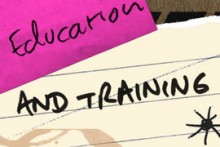LEADERSHIP STRATEGY: TRAINING vs EDUCATION

"educate for knowing train for doing"
When most people think training they envision a classroom with an instructor, workbooks, and power point slides. This scenario does not describe training—it describes education. There is a place for education,but don’t confuse it with training. When it comes to actually doing a job rather than just kowing about it, training is essential.
By LSI contributor Jim Hopes
Optimally, training should be a one-on-one activity between a manager and the person they are looking to develop, whereas classroom education is a group activity. Training is best accomplished on the job. In The Knowing-Doing Gap, Jeffrey Pfeifer and Robert Sutton point out that the best companies embed the process of acquiring new knowledge in the actual doing of the task and put less emphasis in formal training programs. Education has its place. Professionals such as surgeons and pilots spend a great deal of time in the classroom early on. Once they reach the intern program for physicians or start putting in the flight time required to become a commercial pilot, they are being trained usuing a learn-by-doing process. I have vivid memories of my first hours in a Piper Cherokee with a flight instructor. I had only completed half of my ground school at that point.
How much time do you spend in the field or on the job with your people? If you do spend time in the field, how much of that time is spent doing the job with or for them instead of coaching them on what they did well . We recommend a benchmark of asking trainees what went well three times during a feedback session…before asking them what could have been done differently. Most know when things didn’t go well. Once clarity is reached, you can then help them envison a mental picture of a more effectivebehavior . Training develops people to DO the job, whereas education teaches people to KNOW about the job.

Jim Hopes
CEO Center for Sales Strategy, Inc.
This post is sponsored by a Center for Sales Strategy white paper
The 3 Ts …Talent+Training +Tactics = Performance